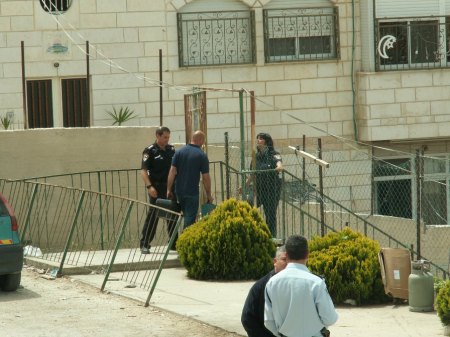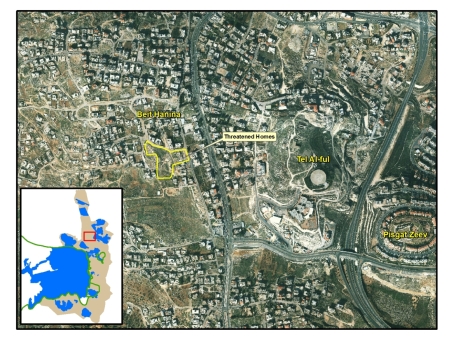“There’s an Eviction in Beit Hanina” said a text message on my phone last Wednesday (18/4/12). I knew it could happen, already since February last year, when the Palestinians lost the court case, but I didn’t know when and whether the police would assist the settlers with evicting the Palestinian families from their homes. Later in the day, when I got to the place, the locksmith was putting a new lock on the door. Few Palestinians, women and children, were talking to the Jerusalem policemen watching their home being taken for the benefit of the Israeli settlers.
 The locksmith enters the house guarded by Jerusalem policemen
The locksmith enters the house guarded by Jerusalem policemen
The story of the property begins before the establishment of the State of Israel in 1948. According to the settlers, a parcel of some 10 dunams in the area of Beit Hanina, north of Jerusalem, was bought by Jews from the original owners. By the end of the 1948 war, the land was under the control of the Jordanians. Following the 1967 war, the land was in the hands of Israel, and was annexed to Israel as part of the extended municipal borders of Jerusalem.
The Palestinian Natsheh family built the two homes that were evicted on Wednesday some 15 years ago. The land, according to their claim, was long owned by their family. They told me that their grandfather had a small stone factory on the land already before 1967.
Eventually the Jerusalem local court ruled that the Palestinian family must evict the houses and accepted the settlers’ claim.
Despite being perceived as merely a matter of property rights, this is first and foremost a political matter. The establishment of a new settlement at the heart of a Palestinian neighborhood has wide implications. Locally, this settlement creates yet another place of friction between radical settlers and Palestinians, this time in the quiet neighborhood of Beit Hanina. In addition, this new settlement is part of an effort by the settlers to prevent a future agreement between Israel and the Palestinians based on two states, and on two capitals in Jerusalem. According to such an agreement, the Palestinian neighborhoods in East Jerusalem will be part of the Palestinian capital, and the Jewish neighborhoods will be part of Israeli capital. If the settlers succeed in bringing significant number of Jews into the Palestinian neighborhoods, such an agreement will be much harder to implement.
And finally, the legal basis for the settlers’ entrance to the houses is threatening a basic claim of Israel: We claim that Palestinians who lost their properties during the 1948 war cannot return to them because it will destroy the legitimate right of the Jews for self determination in an independent state. However, this case is actually accepting the right of Jews to return to their properties. If that is the case, the Palestinians will rightly claim, that they should have their right to return to their properties. This way, the settlers may lead Israel to its own destruction.
